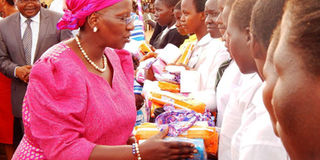Counties urged to fight FGM at grassroots

Anti-Female Genital Mutilation Board Chairperson Lina Jebii Kilimo gives sanitary towels and rubber shoes to teenage girls. More than 800 girls have fled their homes to avoid female genital cutting that is still rampant in many parts of western Kenya. FILE PHOTO |
What you need to know:
- Lina Jebii Kilimo said counties also need to formulate laws and policies that will protect the girl child from the outdated practice.
- She made the remarks Thursday at Kathwana in Tharaka Nithi County during celebrations to mark the Menstrual Hygiene Day.
- Counties need to make deliberate efforts to improve the welfare of the girl-child.
- More 3,000 school going teenage girls from various schools received sanitary towels, rubber shoes and panties.
County governments have been urged to domesticate the Prohibition of Female Genital Mutilation Act to ensure its comprehensive implementation at the grassroots level.
Anti-Female Genital Mutilation Board Chairperson Lina Jebii Kilimo said counties also need to formulate laws and policies that will protect the girl child from the outdated practice.
“As devolution seeks to take a firm hold in the new dispensation in the country, counties are better placed to draft, debate and adopt various policies that will ensure that the vice is completely eradicated,” she said.
She made the remarks Thursday at Kathwana in Tharaka Nithi County during celebrations to mark the Menstrual Hygiene Day.
She noted that counties need to make deliberate efforts to improve the welfare of the girl-child.
HARMFUL PRACTICE
“Women don't need to undergo FGM. We have to get rid of this harmful cultural practice that continues to hurt our women physically and psychologically,” said Ms Kilimo.
She also congratulated the recent move by President Uhuru Kenyatta to give county commissioners executive powers saying it will go a long way into ensuring the retrogressive practice is weeded out completely.
Ms Kilimo also noted the vice was still rife in the Tharaka region and some parts of Meru and Embu counties and called on chiefs to sensitise parents on the dangers of the outdated practice.
The event saw more 3,000 school going teenage girls from various schools receive sanitary towels, rubber shoes and panties.
Ecotact CEO David Kuria who was one of the guests said a large percentage of school going teenage girls have inadequate knowledge of menstruation and how to manage it.
BREAK SILENCE
Mr Kuria said it was time to “break the silence” on menstruation so as to demystify the myths surrounding the topic.
He noted that a huge number of the teenage girls also used unhygienic sanitary pads that exposed them to dangers of infections. At the same time, sanitary wear was beyond the reach of many girls because they are too expensive.
He also observed that girls schooling in remote areas were most affected.
“We are also focusing on educating the girls about menstrual management. Startling statistics show girls continue missing many school hours during their menstrual cycles,” Mr Kuria said.
Tharaka Nithi County Governor Samuel Ragwa called for a revision of the school curriculum to ensure girls are taught on menstruation cycles.
“The national government has to do more to ensure girls don't miss school. As Tharaka Nithi, we will set aside funds to ensure this is achieved,” Governor Ragwa said.





